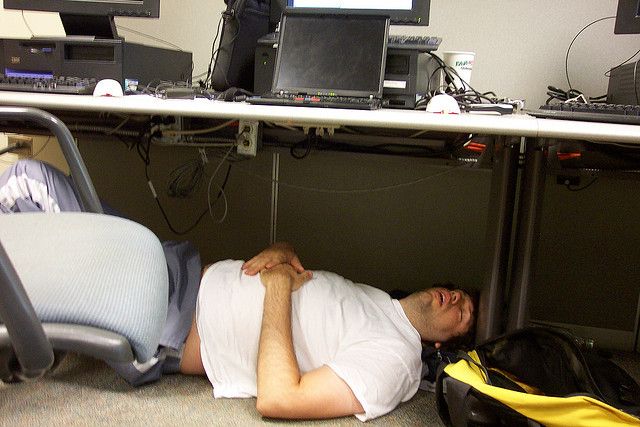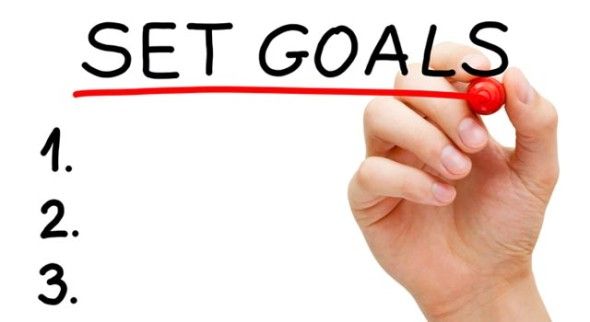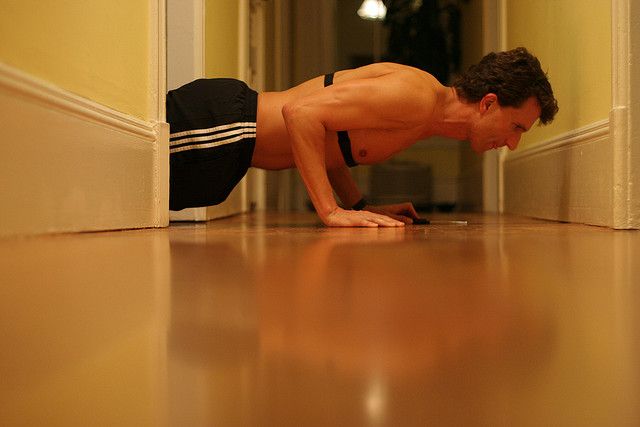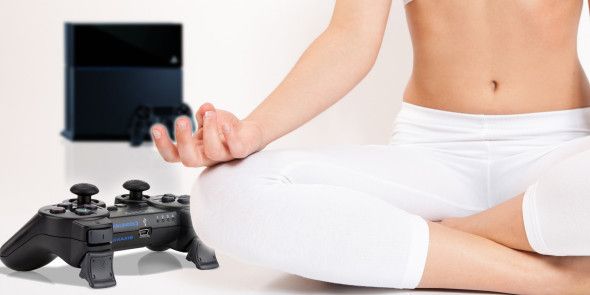On those days when our 'to do list' extends as long as our arm, trying to justify distracting ourselves with something not on that list seems impossible, and fills us with irrepressible guilt.
Contrary to belief though, there are some distractions that could actually make us more productive.
Take a Nap
The motto of those busy types who hold up their jam-packed schedule with exhausted pride is usually something like 'sleep is for the weak' or 'I'll sleep when I'm dead', but taking a short power nap can actually give you a hearty boost in energy. This isn't surprising, given the vast majority of animals enjoy polyphasic sleep schedules (sleeping more than once per day), whereas many humans (apparently) unnaturally force ourselves away from this sleep pattern.
As the Sleep Foundation says,
'As a nation, the United States appears to be becoming more and more sleep deprived. And it may be our busy lifestyle that keeps us from napping. While naps do not necessarily make up for inadequate or poor quality nighttime sleep, a short nap of 20-30 minutes can help to improve mood, alertness and performance'.
The benefits of different nap lengths is up for debate, however. Some claim that six-minute naps can help to improve memory, whereas Dr Sara Mednick opts for the 10-20 minute nap, claiming benefits including improved alertness.
With napping ambassadors including Winston Churchill and Leonardo Da Vinci, who are we to argue?
Revisit your Goals
The Dominican University in California found that people who wrote down their goals achieved 61% of those aims, whereas only 43% of goals which were unwritten were achieved. However, by revisiting goals each week (and also making these goals publicly accountable), that success rate rocketed to 76%.
So, simply by setting aside some time to revisit your goals and check-in with how you're getting on, you're already helping to improve your chance of success.
If you're a manager, you can also use goals to help improve your employee's performance. Psychologist Dr. Edwin Locke found that 'employees were motivated to improve performance by having clear goals and appropriate feedback.
Goals are also motivational for a team, as working towards a goal can give everyone in an organization a sense of purpose and help to energize them'.
Spend Time Outside
Richard Ryan, professor of psychology at the University of Rochester said "Often when we feel depleted we reach for a cup of coffee, but research suggests a better way to get energized is to connect with nature", yet so few of us have the daily self-discipline to enforce that fresh-air upon our lungs.
Additional time spent outdoors has been shown to not just recharge our batteries but also to help our bodies stave off physical illness. Naturally, the more time spent outdoors seems to be better, but even small amounts of time (even just sitting) outside the confines of a building (ideally in a natural rather than urban setting) can 'ward off feelings of exhaustion' with ' 90 percent of people reporting increased energy when placed in outdoor activities' (University of Rochester). Even being outside for just 20 minutes per day can have a profound effect.
Play
Take a look at most dynamic startups and dot-com companies and you'll easily see the link that's being drawn between effectiveness, productivity, and having 'fun'. Whether that's a game of foosball, frisbee, chess, a yoga, meditation or even magic class, or simply whiling a few minutes playing a classic computer game.
Check out the above TED talk from Dr Stuart Brown on how play can not only influence the positive development of children, but also make us smarter and thereby more productive as adults.
Watch a YouTube Video
According to the Pomodoro Technique, an easy way to get more tasks done and to stay focused for longer is to split your time into 25 minute increments. Complete four of these with 5 minute breaks between each one, then take a 25 minute break at the end. Repeat.
This begs the question, 'what should I do during those breaks?'. One productive option (believe it or not) is to quench those YouTube cravings. Watch a video that makes you happy. As mentioned later on in this article, if something makes you laugh, feel inspired or causes other positive emotions within you, you'll receive a hit of dopamine which helps to spur you into action during your next Pomodoro cycle.
Not convinced? Take 3 minutes to watch this video to see if it gets you raring to go:
Read
Taking a short amount of time out of our day to read a chapter of a novel, biography or a short story can not only help improve our 'Theory of Mind' (the ability to comprehend that others may have a different viewpoint to our own), but can also 'reconfigure brain networks for at least a few days'.
This helps with what is similar to 'visualization' in sports. For example 'just thinking about playing basketball, can activate the neurons associated with the physical act of playing basketball'. Therefore, by taking time to read books which talk about life, work or business problems, we can actually be helping ourselves to prepare for, and solve, these problems in our own lives.
You can even read books in small doses with email. This could be useful when you are in the office.
Work Out
One of Richard Branson's 'secrets' to his impressive productivity levels is that he works out every single day. But now, we don't have to take Sir Rich's word for it. A study by Stockholme University has shown that 'it is possible to use work time for exercise or other health-promoting measures and still attain the same or higher production levels. The same production levels with fewer work hours means greater productivity, while at the same time individuals benefit from better health as a result of the physical activity'.
Not only does exercising each day mean you squeeze more into those 24 hours, but it also means you'll most likely be sick far less often, thus increasing productivity in the long-term too. If you don't think you'll be able to stay motivated to exercise regularly, there's plenty of workout apps that can help with that!
Take a 'Tea' Break
Taking a minute to pour yet another cup of filter 'coffee' is usually a form of procrastination and desperation to stay on track, but did you know you that can drink more strategically in order to help maintain your energy and productivity.
A study 'published in the Journal of Alternative and Complementary Medicine, showed that when subjects consumed 120 ml (about half a cup) of goji juice – per day – they felt a significant raise in energy levels, mental acuity, focus and feelings of happiness and health' (NaturaHealth365).
Or, if you're a sucker for coffee, try brewing good quality coffee with '2 tablespoons of grass fed butter and 1 tablespoon of Medium Chain Triglyceride oil. You'll give yourself a rush of fueling ketones and regain focus' (The Daily Beast).
Start a Gratitude Journal
Taking just a few minutes out of your day to start a gratitude journal (such as the 5 Minute Journal) can lead to an increased sense of well-being, happiness and thereby motivation and productivity. This is different to simply feeling you're 'better off' than someone else, but actually being consciously grateful for what you actually have (no matter how small those things may be).
One of the main reasons this has an effect on productivity is due to the release of dopamine that it causes, which is a neurotransmitter that helps to initiate action. So, why wouldn't you want to keep a personal journal!
One study by Emmons and McCullough found that this kind of daily appreciation leads to 'greater increases in determination, attention, enthusiasm and energy', while another study suggested that higher levels of gratitude also leads to better sleep and lower anxiety.
Meditate
Mindfulness meditation is arguably becoming more and more of a 'buzzword' in the start-up scene, but that's not without reason. Fortune Magazine said of meditation:
Devotees include junk-bond-king-turned-philanthropist Mike Milken; Bill George, the former Medtronic CEO; ad industry mogul Renetta McCann; and NBA coach Phil Jackson. Silicon Valley is full of meditators, such as >Marc Benioff, the CEO of Salesforce.com, and Larry Brilliant, head of Google's philanthropic efforts. Naturally, a crew of Google employees has organized twice-weekly open meditation hours, at which it has hosted Tibetan monks and a team of mind-science researchers….Particularly hard-core is Bob Shapiro, the former CEO of Monsanto, who has done three ten-day silent retreats and is considering a 30-day tour.
Studies have also shown meditation to help with stress reduction, increased focus and cognition. By focusing your mind on the present, rather than external issues, you're able to observe your thoughts and problems from a more objective distance. On this topic, the Eco-Institute said 'When you learn how to simply let go, you can step away, if only momentarily, from the problems of everyday life'.
By practicing this skill for just a few minutes each day, we can become more adept at focusing our energies on the task at hand without being distracted by external stimuli, thus helping us to become more productive and less stressed.
Which Is Your Productive "Distraction"?
In essence, there's no need to squeeze 'work' related tasks into every minute of our day. Not only will this lead to burnout, but it'll also mean we're not getting enough variety into our lives as a whole. By realising we can actually achieve more by fitting some productivity enhancing distractions into our day, we can get the best of both worlds.
What other distractions help you to become more productive?
Image Credits: Workout: SuperFantastic via Flickr









